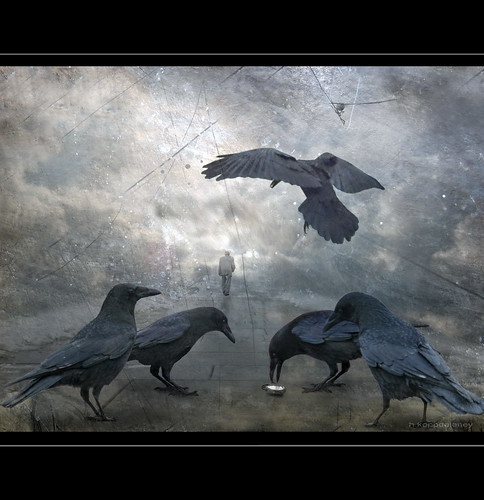We run our website the way we wished the whole internet worked: we provide high quality original content with no ads. We are funded solely by your direct support. Please consider supporting this project.
What’s Wrong With The World?
Hartwig HKD via Compfight
The reports coming out of Fort Hood this morning once again highlight that our world is messed up. And it often feels like we are rearranging the deck chairs on the Titanic as we try to find answers to address the problems we face. Here are some reflections by Greg on the real “war” that plagues our situation. When we fail to see this, we fail to enter into the kind of victory that God has to offer.
God’s Kingdom is “not of this world,” and neither is its way of advancing. The Jews’ worldview of Jesus’ day embraced the reality that God confronted spiritual opposition when carrying out his will on earth. The OT depicted this as evil forces in the form of cosmic monsters and hostile waters that threatened the earth. Many Jews came to believe that the earth was under the control of evil forces. Many also believed that in the near future God was going to bring this demonic oppression to an end—an intensified view of war against evil called an apocalyptic worldview.
The New Testament is steeped in this language. It refers to rulers, principalities, powers, authorities, dominions, cosmic powers, thrones, spiritual forces, elemental spirits of the universe, gods, and a number of other spiritual entities. As many scholars have argued, in the first century apocalyptic worldview, these various titles refer to different kinds of powerful cosmic beings or forces that exercise an oppressive and destructive influence over particular aspects of creation, society and human-made institutions.
Trying to understand what’s wrong with our world, with creation, and with human society necessarily falls short unless we recognized a transcendent, demonic power at work. Many have identified the destructive work of Western individualism, consumerism, secularism, technology, nationalism, the media, the military industrial complex, and entertainment, to name a few. These powers operate at a level of systematic oppression, and the kingdom of God stands against these powers. It offers an alternative to them.
It’s not that Jesus or anyone else in the early church placed all the blame for the evils in society and in creation on these powers of evil. The New Testament clearly holds people responsible for their own choices. But in keeping with the apocalyptic worldview, Jesus and the earliest disciples saw the powers as centrally involved in all evil, influencing and empowering the evil that resides in human hearts.
There is a real war going on, whether we see it or not. For “our struggle is not against flesh and blood, but against the rulers, against the authorities, against the powers of this dark world and against the spiritual forces of evil in the heavenly realms” (Eph 6:12). We are at war, but it’s a war of a different kind. We don’t fight the powers with the weapons that the powers take up. We wage war by revolting against violent patterns and living in love.
Here’s the challenge for us:
A soldier in battle conducts himself very differently from a civilian on vacation. The vacationer naturally wants to indulge his or her interests and desires, while avoiding inconveniences as much as possible. But soldiers understand they are called to sacrifice their interests and desires and suffer major inconveniences, if not their lives, to advance the cause for which they fight. The question every follower of Jesus must honestly ask is this: Do I live my life with the mindset and values of a vacationer or a soldier? (Understanding Spiritual Warfare: Four Views, 151).
Category: General
Tags: Current Events, Evil, Kingdom Living, Living in Love, Soldiers, Spiritual Warfare
Related Reading

Grieving with the God who Pulled the Trigger?
Lawrence Krauss recently wrote a thought-provoking, soul-searching essay for CNN Opinion entitled, “Why must a nation grieve with God?” Krauss was disturbed by a comment made by President Obama at a memorial service for the victims of the tragedy at Newtown CT. Commenting on Jesus’ statement to “Let the little children come to me,” Obama opined:…

On Hacking Off Our Own Limbs
Nadia Bolz Weber posted this weekend on The Sarcastic Lutheran, and we thought you’d enjoy her thoughts on hacking off our own limbs for Jesus. Don’t worry, you won’t have the urge to find an axe after you read this. Or at least not a real axe. From the post: And here’s the thing…that story? The…

Why is America Becoming More Politically Divided?
I watched a 20/20 special the other night on politics in America. The show explored the “growing political divide” in our country. Here’s some of the information found in this program. * Since the early 70’s Americans have become increasing polarized in their political views. Communities that once were pretty evenly split politically are now…

Jesus Said a Lot of Weird Stuff. What If He Actually Meant it?
Our friend Shane Claiborne has a way with words (and deeds). In this article from a few years ago (sent to us by a reader: thanks Jason!) he asks the question, What if Jesus meant all that stuff? How would the rest of the world see us if we actually did what Jesus did? From the…

What Does it Mean to be “Holy”?
Image by much0 via Flickr People today frequently associate the word “holy” with a list “do’s” and “don’ts” that “godly” people are supposed to adhere to. The concept of “holiness” in the Bible, however, is not primary about behavior. It rather refers to something that is unique and set apart from more common things. God is…

A Brief Theology of Faith
It is often argued that Hebrews 11:1 provides us with a clear definition of faith. The NIV translates it as, “Now faith is confidence in what we hope for and assurance about what we do not see.” Most of the times when we use different translations of the Bible, the differences between them are about…

